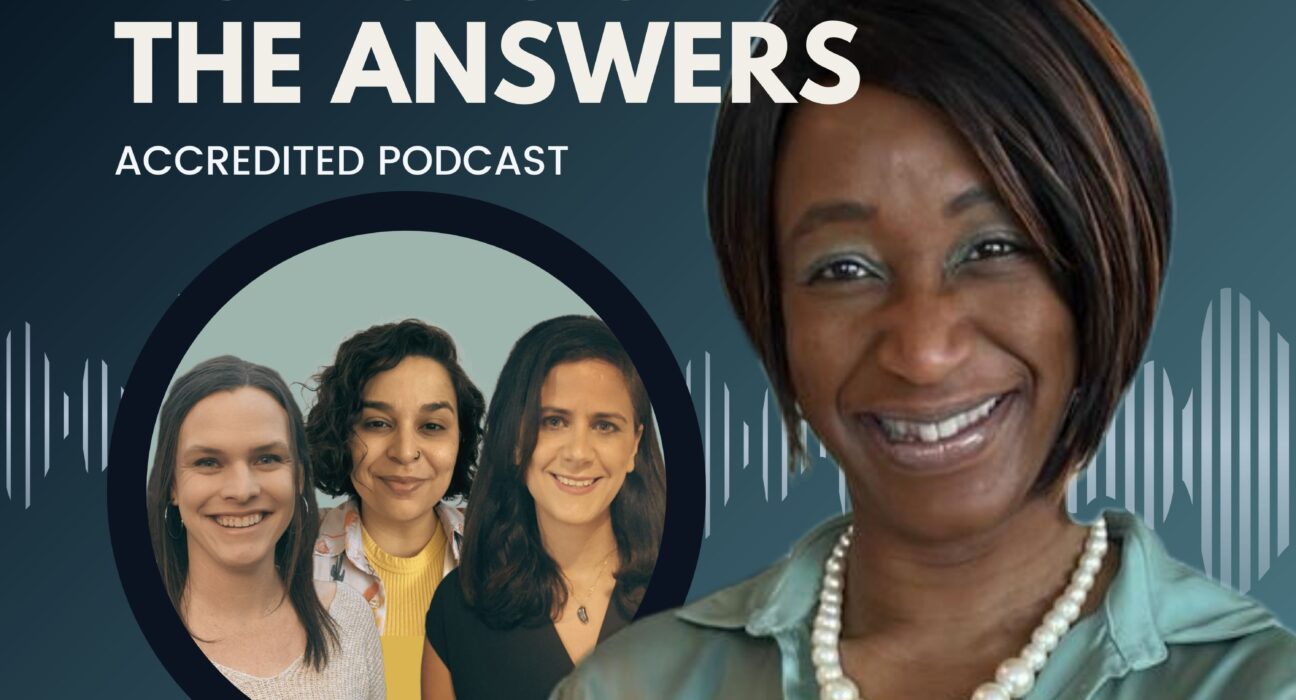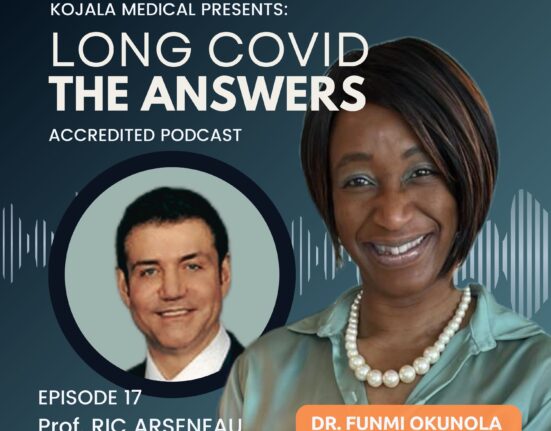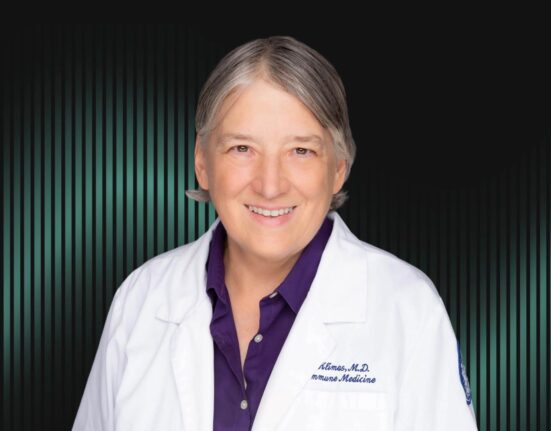
Join Dr Funmi Okunola and Patient-Led Research Collaborative (PLRC), led by Lisa McCorkell, Gina Assaf, and Letícia Soares, as we dive into the urgent conversation about Long COVID, where experts reveal eye-opening insights on reinfections, public health, and the long-term impacts of SARS-CoV-2. Learn how COVID-19 could be linked to chronic illnesses like diabetes and heart disease, and why masking, clean air, and vaccines are crucial to prevention. With calls for more research, funding, and education, this episode sheds light on what’s being done—and what still needs to happen. Don’t miss this informative discussion!
Guest – The Patient-Led Research Collaborative
Note: The podcast has no bias. All conflicts of interest are highlighted with individual guests.
Healthcare Professionals | Earn 0.5 Certified Mainpro+® Credits! Please register/login to claim your CPD/ CEU credits.
Podcast Overview:
Long COVID: What You Need to Know
Explore the latest findings on Long COVID’s risks, reinfections, and chronic illness impacts.
Reinfections and Immunity
Are reinfections increasing risks? Insights into immunity and prevention strategies.
Chronic Illness Connections
Examining links between Long COVID, diabetes, and cardiovascular diseases.
Public Health Measures
The role of prevention, education, and research in combating Long COVID.
Future of Long COVID Research
Key areas for study and the importance of awareness in managing the long-term impacts
DISCLAIMER: The information in this podcast is provided for informational purposes only. You should not use any information discussed in this podcast and related materials to make medical or healthcare related decisions. Always consult a your physician or other qualified health care provider with regards to diagnosing managing your medical condition. Any medications or treatments, including any discussed in this podcast, should be initiated and managed by a qualified health care professional.
Podcast Transcript:
Healthcare Professionals: Please note to claim Certified CPD / CEU credits toward your medical license (Canada & reciprocal CPD/CEU Worldwide), you will need to register or log in.
Episode 23 – Patient-Led Research Collaborative Part 2– ft Lisa McCorkell, Gina Assaf & Letícia Soares
[00:00:00] Funmi Okunola: The information in this podcast is provided for informational purposes only. You should not use any information discussed in this podcast and related materials to make medical or healthcare related decisions. Always consult your physician or other qualified healthcare provider with regards to diagnosing and managing your medical condition. Any medications or treatments, including any discussed in this podcast should be initiated and managed by a qualified healthcare professional.
Funmi Okunola: Welcome to Long COVID -The Answers. Today’s Episode is “Long COVID -The Answers Talks to the Patient-led Research Collaborative – Part 2”.
This is the second episode of a two episode series involving this organization. Today we’re going to look at an example of the work that the organization does. I apologize for sounding nasal today as I myself am recovering from a recent COVID-19 infection. I’d like to introduce Gina Assaf and Letícia Soares who are both part of the Patient-Led Research Collaborative.
The Patient-Led Research Collaborative is a group of Long COVID patients and patients with associated illnesses such as ME/CFS and POTS who are all researchers. They were born out of the Body Politic Slack support group and did the first research on Long COVID in April 2020. They are all researchers in fields of health and science in addition to having intimate knowledge of COVID-19.
I first came to [00:01:00] learn about Long COVID through Body Politic and have read and gained a lot of evidence-based knowledge from PLRC’s research. They are really changing the face of medicine by providing scientific research that is patient focused and have led and spearheaded advocacy and scientific recognition of Long COVID.
Welcome to Long COVID – The Answers.
Gina Assaf: Thank you. Happy to be here. Thank you so much.
Funmi Okunola: Gina and Letícia, do you have any conflicts of interest to declare? Good.
The second part of the interview will focus on your recent pre-print entitled “Long COVID and Associated Outcomes Following COVID-19 Re-infections,” insights from an international patient-led survey, September 2024.
Let’s repeat the definition of Long COVID as stated in your paper, which I believe is based on the WHO definition, and move forward from there. Long [00:02:00] COVID is an infection associated chronic condition that can develop after a SARS-CoV-2 infection, regardless of acute illness severity or vaccination status, and is defined as symptoms that persist, are new at onset, or worsen for at least three months after acute infection.
Debilitating fatigue and Post Exertional Malaise, or PEM, are among the most frequently reported symptoms of Long COVID, with fatigue being a common feature of an infection associated chronic condition. PEM is indicative of Myalgic Encephalomyelitis/Chronic Fatigue Syndrome, or ME/CFS, with nearly half of people with Long COVID meeting diagnostic criteria for ME/CFS.
The international patient centered approach is excellent because we have the patient’s voice. How do you navigate the lack of a professional diagnosis of Long COVID? In other words, how can you be truly sure that the people responding have Long COVID? [00:03:00]
Gina Assaf: So, I can take that one. In our research we always try to use accessible language and provide definitions that reflect the patients experience rather than just clinical jargon.
So actually, in this survey, instead of asking them “Do you have Long COVID?” We asked them if after COVID they experienced new or ongoing health issues that lasted three months or longer, and which was to us an indicator that you have Long COVID, and this helps us categorize responses based on people’s firsthand experiences, and so we’ve done this in other surveys, and this is how we approached it in this survey.
Funmi Okunola: Excellent. You were looking at re-infections and the risk of developing Long COVID after re-infections. Given that the majority of people with Long COVID are under fifty, and in this age group asymptomatic infection is common, and that people tend to test when they have [00:04:00] symptoms, what did you do to accommodate this variable?
Letícia Soares: Yeah, that’s a great question because asymptomatic cases are a challenge for researchers on Long COVID and COVID-19 in general. It’s really hard to catch asymptomatic cases or identify them with surveys like ours, so it is an intrinsic caveat of our methods. However, we did ask people who reported they had COVID, how was it that they knew that they had COVID, if they got a medical diagnosis, if they tested positive, if they were in close contact with somebody else who had tested positive, and whether or not they had symptoms.
So based on these answers we are able to parse out this data. However, when we look at it, like most people who participated in our research, [00:05:00] they had symptomatic infections, not all of them tested positive, and we also asked every participant – invited basically everyone to answer the survey, including people who recorded they never had COVID.
Then we let these people who never had COVID answer all of the questions related to non-COVID. So, they answer questions about fatigue, about post exertional malaise, menstrual health symptoms, non-COVID symptoms, and so forth, and then we compare the answers between this group who said, “Okay, I’ve never had COVID” with the participants who had COVID infections and re-infections, and it’s very interesting because we see a clear signal in our data in differences between the two groups, and we see some variance, [00:06:00] some variability in the group that reports never having COVID. So, we just hypothesized that there’s no way of us knowing this, that it could be people who had COVID-19 don’t know they had COVID-19, and are experiencing Long COVID symptoms themselves, and we are catching them in this group who reported never having COVID. But it’s impossible to know exactly with the design of our survey and the scope of our study.
Funmi Okunola: Thank you. Given this was a survey looking at re-infections among over 3,000 individuals, why did 22% of those participating report never having COVID-19, and 42% report experiencing it once?
Gina Assaf: So, for any kind of study or to look at the impact of anything, having [00:07:00] controls and comparison groups is very useful. So, we wanted to have a comparison group with those who reported never having Long COVID. The group of participants answered the same questions as a group of participants who had COVID infections, and this helps us with the comparison.
They were able to say things like, for example, bleeding with clots is a menstrual health symptom that increase odds of being reported with one infection compared to never having one COVID, and then it actually increased further with a re-infection. As Letícia was saying, it’s an imperfect comparison group because we could have people who had asymptomatic COVID reporting never having COVID.
We were still able to detect patterns associated with the impact of the COVID infection and re-infections. So that explains why we let those people into our survey, or we wanted them to answer the survey.
Funmi Okunola: Excellent. Thank you. What sex and [00:08:00] professions reported the highest number of COVID infections?
Letícia Soares: Females were 79% of our sample, and we also had a difference that was statistically significant. So, the average number of infections reported by females was higher compared to males, and when we look at the professions that participants reported, we saw that people that were in K-12 education had on average, the highest numbers of COVID infections.
That was followed by medical professionals who were delivering direct patient care. Another very interesting result related to demographics is that the participants who reported they lived with children who attend [00:09:00] school or daycare were on average reporting more COVID infections than those who said that they don’t live with children of that age, and I think this indicates demographics that are at risk of COVID-19 and thus Long COVID.
Funmi Okunola: Yeah, I think that was one of the most important discoveries of your research, and particularly their environments where there’s no air filtration or ventilation being provided in schools, no masking, not even in outbreaks, and in the medical profession now there’s no mask mandates, and I suspect a lot of the air filtration and ventilation systems are out of date in these older hospitals.
So, patients, children, people who work with them, wider community are all being put at risk. That was a really important discovery. In the first few paragraphs you state that while vaccinations and boosters prior to infection are associated with a lower [00:10:00] likelihood of Long COVID, re-infections diminish their protective effect. Can you please elaborate on this statement?
Gina Assaf: Yes. So, this means that for example, assuming all else is equal, a person let’s say who has three vaccines, but two COVID infections (which we are seeing happening) is more likely to develop Long COVID than a person would who has like three vaccines and one COVID infection. So basically, while vaccinations have a small protective effect against developing Long COVID, the risks come from getting a second, a third and just getting re-infections. More re-infections makes it so that you’re getting less protective effect from the vaccine, and the takeaway from this is that while vaccinations are helpful, they don’t protect you fully from Long COVID and it’s worthwhile for people to try not to get COVID even with a [00:11:00] vaccination.
Funmi Okunola: Yes. It’s another really important finding that needs to be broadcast loud and clear. I had a conversation with a colleague the other day who mistakenly thought (it wasn’t a doctor) that “Oh, I’m vaccinated. I’m not going to get infected.” I cannot believe that that belief is still going around. Can you define Long COVID remission and talk about its prevalence in your research?
Letícia Soares: Yeah. So, we specifically used the word “remission” instead of “recovery” because we couldn’t tell based on our data whether people’s symptoms have come back after the survey, and in general, we still know very little about recovery and remission from Long COVID, whether recovery is permanent or symptoms may come back with re-infections, for example, and even, [00:12:00] okay, we are observing remission, what does it mean to be in remission, how long does it last, and all of those factors.
In our study we defined remission indirectly. So, everyone who said at some point, “I had Long COVID,” and then we asked again at the time of the survey if they were experiencing symptoms. If they said, “No, I’m no longer experiencing symptoms of Long COVID,” we said that they were in remission.
In general, the data that we got is that remission rates were basically 8% of those who reported ever having Long COVID. So that’s very, very low. Yeah. So, it’s very concerning, and again, it brings us back into the importance of avoiding COVID infections in the first place.
Funmi Okunola: Yes, that was astonishing. A [00:13:00] lot of the research looks at the incidence of PEM or Post Exertional Malaise and re-infection. Why was this important?
Gina Assaf: So, as patients who experienced PEM, and this work is patient-led, we understand the influence of PEM on our lives and the burden it has on us and generally patients with Long COVID.
PEM is a highly debilitating symptom. It’s disruptive. It can be really hard to manage, and it’s the cardinal symptom of ME/CFS. So, we know a lot about the effects of PEM on the patient’s quality of life, and there’s evidence now that at least 50% of people with Long COVID have PEM, and so detection of PEM is also a metric that many other researchers don’t prioritize, that are not patients.
So as a patient group, it’s important for us to represent a metric that is important to patients, [00:14:00] and this is one of them. That’s why it was highlighted in this research and other research that we’ve done.
Funmi Okunola: Thank you. Yeah.
Letícia Soares: I just want to add to that because we also didn’t know, let’s see, how many infections does it take to get an ME/CFS or get PEM, for example, and I think being able to have data that show how, if you, maybe you may not get PEM with the first infection, but if you get every infection, your odds are developing a phenotype of Long COVID that is more debilitating than what you had before increase. I think that’s something that is very, very important in terms of the biology of infection-associated chronic conditions.
Funmi Okunola: Thank you, Letícia. What effect did the perimenopause and menopause have in [00:15:00] your findings?
Letícia Soares: That’s another cool thing that we did. I’m very proud of it because based on our lived experience, we know how these groups are never parsed out in surveying and research, so we wanted to be able to understand, okay, who is menstruating and who was menopausal or perimenopausal, as reported by the participant.
If you’re not menstruating, we gave just a list of possibilities of why that could be. So that’s why we have this data, and we were able to do this analysis. One of the things that we saw is that with people in menopause and perimenopause, they are more likely to report fatigue than those who are not, and that’s that trend in increase with the number of COVID infections.
But we didn’t [00:16:00] see any effect of being menopausal or perimenopausal in the probability of reporting PEM. However, (and that’s a little bit tricky here) when we look at age alone, we see an increase in the probability of reporting PEM that peaks at around 45 years of age, and that’s in the general population. It’s a perimenopause age, so we think that this could indicate some age-related endocrine or physiological factor that could be at play there in determining people’s risk of developing PEM at that age.
Gina Assaf: So, compared to females who reported never having COVID-19, the chances of them worsening of their ongoing or chronic health issues related to menstruation INCREASED with re-infections.
That was a finding that we presented in our research. So, of the female participants who experienced this worsening of symptoms, 13% said they had the symptom before having COVID-19, but 64% reported this symptom started or worsened after their first COVID infection.
Then among those with the re-infection, 31% reported a COVID-19 re-infection triggered this symptom onset. Then 80% – 82% said it got worse with a re-infection. So, all of this is like an indication that, yes, with re-infections and with at least one infection, a lot of these symptoms are getting [00:18:00] worse for those who reported any issues, even those who had some symptoms before.
Letícia Soares: Yeah, I just want to add that with this entire component of the menstrual health and reproductive health, we took a lot from our personal experiences and what people in the Long COVID community were communicating about how their periods were disrupted, how they were entering menopause way too early, and we also got a lot from the chronic illness community, people with ME/CFS before Long COVID, because there is some of their research that had shown this worsening of symptoms associated with the menstrual period, but we really didn’t know much about it.
So [00:19:00] we designed in a way that we took all of these insights from the patient community so we could have this data, and hopefully clinicians will be aware of that, and also researchers will now try to understand why is it that we are seeing this worsening of those symptoms, of some specific symptoms also with re-infections.
Funmi Okunola: So, a couple of things. Not only did you find that menstrual symptoms were worsening with COVID infections and re-infections, but you also found that some women were going into the menopause earlier with COVID infections and re-infections. Is that right?
Letícia Soares: No, we didn’t look into that. That was just from other research and information from experiences of people in the patient community.
We wrote a review paper on [00:20:00] reproductive health symptoms and conditions associated with Long COVID, and other infection-associated chronic conditions. Within Long COVID we reported some clinical case reports of people with Long COVID that had a premature ovarian failure. But that comes from the literature and also knowledge of the patient community that we just wanted to amplify in that review.
Funmi Okunola: I wasn’t aware of that. It is incredibly scary, and there needs to be more awareness drawn to that.
I know that Prof. Danny Altman, an immunologist in the U.K. – I don’t know if you’ve heard of him, he works a lot in the Long COVID space, is doing research specifically on menstruation, the effects of SARS-CoV-2 and Long COVID. Are you guys sharing information or working [00:21:00] together in that respect?
Letícia Soares: I know him and his work. I have read his review so many times, but we are not in direct collaboration with him. Maybe we should.
Funmi Okunola: Yeah, I think you guys should team up. We’re all going to conquer this together, working together, but he’s trying to recruit women because he’s specifically looking at the effects of COVID on reproductive health and women. So, it might be an idea to share some of your findings with him.
Okay. Do you know how this effects menstruation compared to the effect of vaccination impacting menstruation? So how does the effect of repeated COVID- 19 infections affect menstruation in comparison to the effect of vaccination that can impact menstruation?
Gina Assaf: So, we didn’t look into this in our research in this paper, but I know [00:22:00] that there is some data on that, but I can’t give you any conclusions on that based on the analysis of this research. So, we don’t know that, but I do know there are some papers that look into that. Now, I don’t know if any look into the comparison – maybe an isolation, and we can look at the numbers there, but we didn’t in this paper.
Funmi Okunola: Yeah, it’d be really interesting to look at that because there’s all this worry about vaccination causing myocarditis, but we know the virus is far more deadly and by several factors.
I know that there’s a worry amongst, I often hear this amongst patients. It’s one of the first questions they ask, “Is it going to make me infertile being vaccinated?” and I’m really sure that the virus is far more deadly, but it would be good to have the evidence to back that up.
Letícia Soares: Yeah, we also need to have more research on the effects of vaccination in people with Long COVID because we go [00:23:00] through a lot after vaccination, and it is a matter that should wait in deciding whether or not you should get a vaccine, or you can get a vaccine as a person with Long COVID.
So having more information that can help patients and providers make that type of decision would be really great.
Funmi Okunola: Yes, I agree, and there’s a little aside. One of our advisors, Prof. Ric Arseneau – he’s probably the top person in Canada who’s worked with complex chronic disease, has set up a Complex Chronic Disease Clinic for women in the Women’s Hospital here in B.C. He’s got, I think, nearly 30 years of experience. He’s the only person in B.C. providing a service for Long Haulers because all of the clinics were shut down in B.C. Long COVID clinics were shut down. So, he’s the lone physician providing a service for all the Long Haulers in B.C.
Anyway, I interviewed him, and he talks about… ‘cause [00:24:00] he’s enlightened, and we were all unenlightened, pre-Long COVID. His group of colleagues knew that some people would have vaccine reactions. He predicted roughly 6%. So obviously he has some knowledge of this because of his work in complex chronic disease. So again, he’s another person who might be worth linking with.
Gina Assaf: I would say in general, from all the other stuff we’ve seen with the impact of vaccination compared to getting infected with COVID, it definitely is that you are more likely to have negative outcomes by getting infected versus from the vaccine. I can say that generally with all the other stuff that we looked into. But there needs maybe more comparison, and I definitely can say that there is more of a negative outcome getting infected versus getting vaccinated.
Funmi Okunola:So, that’s what I find in the literature, [00:25:00] but there’s a very, very anti-vax um, what’s the word? – ‘culture’ at the moment. So, I think we need to really find some way of pushing home that the virus is far more dangerous, and there’s far more, much more harm than the vaccination and vaccinations on the whole help.
Funmi Okunola: Okay. So, could one of you please summarize the results of your research?
Letícia Soares: Yeah, so the main finding is that COVID re-infections are associated with increased odds of recurring Long COVID. So, your chances of developing Long COVID do increase with each infection, and participants who had experience with infections had higher odds of reporting fatigue, severe fatigue, Post Exertional [00:26:00] Malaise, reproductive health issues, and several symptoms of Long COVID in comparison to those with one infection and also in comparison to those who report never having COVID.
Another super important finding of our research is that re-infections were associated with increased physical functional limitations. So, we demonstrate that disability can get worse with re-infections. It’s really worth avoiding COVID infections in the epidemiological context, right, that we are living now.
Funmi Okunola: And Gina, would you like to comment on how people can avoid being re-infected?
Gina Assaf: Yeah. To avoid being reinfected, ideally, we require masking in health care settings.
People should try to mask themselves in public places. The thing is [0:27:00] ideally, there’s policies around it. There’s investment from public goods, right? Like investing in clean air, better ventilation, UV lights. From a personal perspective, it gets hard because you can mask and you can try to avoid, and we try to do that as the people that are vulnerable.
However, like myself, I got re-infected in August even though I did all those things. I was wearing a mask, but I happened to sit next to somebody in an airplane who actually never got vaccinated and wasn’t wearing a mask, and I got infected from this person.
So as much as we can do, there’s a limit to it, and I think a lot of it has to go with education of the public and investing in better clean air measures and better ventilation, et cetera. Also, I do think getting vaccinated is still a way that helps. It doesn’t prevent completely, but I still encourage people to get vaccinated if they can – if it doesn’t impact their immune system too much. I know, especially with the Long COVID [00:28:00] and folks with ME/CFS and other associated illnesses, they can get worse with vaccinations, but if they can, to try to do that.
Those are just some of the things that I’ve been thinking about myself and hope the public or folks can invest in somehow. Thank you.
Funmi Okunola: How should the World move forward with these results of your research?
Gina Assaf: I think what I talked about in terms of preventing re-infections is one thing, right, doing all of that, but then, our research underscores the importance of looking into the impact of re-infections and the importance of taking re-infections into account.
We know that mostly everybody in the U.S. had at least one infection. One infection now, right? So, we need to move into understanding the clinical course and the pathophysiology of getting Long COVID from re-infections. Does that differ? We need to respond accordingly to the fact that it’s not only one [00:29:00] infection now, but also probably more than one that people are getting, and that’s the norm moving forward for the next few years, unfortunately, unless bigger measures are taken to prevent it. Getting re-infected, and I think also because of the research showing that more people that get re-infected, they’re going to get Long COVID. This underscores the importance of more research, more funding into Long COVID itself.
Because unfortunately, the numbers of Long COVID are going to grow because of the re-infection problem, right? So, we need more funding, more. People looking into it, more measures, more policies to support folks with Long COVID.
Funmi Okunola: Thank you. Letícia, do you want to add anything to that?
Letícia Soares: Yeah, I just would like a public health policy to educate people on the risks of re-infections.
I think efforts in public [00:30:00] health education around Long COVID have just been few and far between – just definitely thoughts and thoughts, and we have a lot of people who generally believe that if I had COVID once and didn’t get any Long COVID symptoms afterwards, it means that I will never get Long COVID.
People just don’t know about this piece of information, so they need to know that they are still at risk, and that with that risk the odds increase as they accumulate COVID infections.
Funmi Okunola: Okay. Yeah. I like to think, having read a lot of research and talked to a lot of experts and also been influenced by one of our advisors, Ric Arseneau, though my definition is slightly different from his and Harvard’s, that I’ve come to understand Long COVID. I think we have a Post COVID syndrome after a SARS-CoV-2 infection, and [00:31:00] my understanding of that is it’s in three different things. So, as organ damage – those are the people that end up in hospital, in ICU, and they have multi-system failure and huge problems with organ damage once they’re discharged.
The second is an ME/CFS type thing, which is the majority of people with Long COVID in the community who are never hospitalized. They get seriously ill or very ill, but it’s more of an ME/CFS type thing presentation of the infection, and the third is that the virus is having an impact on us all in ways unseen.
The vast majority, 90% of the population, are not getting ME/CFS. They’re not being hospitalized, but we’re seeing an increased incidence of diabetes, increased incidence of every type of heart disease, increased incidents of viral re-activation. So, I’m now seeing as a GP, as a family physician, young people with [00:32:00] shingles, and talking to colleagues they’ve incidentally seen that.
I saw something, a writeup that came out yesterday about re-activation of hep B. That’s a health burden that isn’t being looked at. So, I think we have to appeal to people’s selfish gene because at the moment they’re looking at Long COVID as, oh, that’s something that happens to people over there, and anything that has COVID in the sentence, I’m not interested. I’ve got a normal life. Whereas they don’t realize that probably their incidence of diabetes, their incidence of kidney disease, their incidence of heart disease, stroke, dementia is increasing with every infection in the population.
I suspect, and I have no evidence to back this, that about 30% of the population are being affected by SARS-CoV-2 infections, and that’s probably growing. So, I think there needs to be more emphasis on how it’s affecting us all because we’re only going to get the changes with me and you talking about the public demanding them, and [00:33:00] being aware of just how dangerous this is.
I also suspect that in the future we will see that it’s causing an increase in cancers. We haven’t had a long enough lag. Nobody’s really looking at that yet, but other viruses cause cancer. CMV does and has been linked to breast cancer. EBV has been linked to lymphoma.
So, yeah, I think when people become aware, because when I mention this to the public – when I’m telling them about the work that I’m doing, they’re astonished and their eyes widen and they immediately get interested because it takes 17 years for medicine to put research into effect, and Long Haulers cannot wait 17 years.
So, I don’t know how you both feel about what I’ve just said.
Gina Assaf: It resonates a hundred percent with me, and I agree with all of it. I think you know you touch on the medical or like the education part for the public and for medical health care professionals, which I think is going to be key for [00:34:00] making any of the changes we hope for in terms of awareness and changes in behavior that follow so definitely.
You summarize what’s been going on in my head around this and what I’ve seen in research or on social media, Twitter, et cetera, and I think it’s helpful for us to frame some of our work in those potential buckets you talked about to make some impact so that’s really helpful. Thanks for sharing that. Your view on that. Thank you.
Funmi Okunola: Letícia. Do you – did you want to add anything?
Letícia Soares: Yeah, I just agree with everything completely, and there are a lot of things that we are also concerned about in the Long COVID community. We bring these things up all the time, especially the increased prevalence of cancer is something that many people are concerned about, and I think that in terms of awareness and education [00:35:00] I would love to see college professors starting early on this. It’s a basic biology. We study diseases, and we use diseases as case studies in the classroom and all of that.
So, I think people need to be educated in infection-associated chronic conditions just early, early on, because that’s something that they need to expect that it can happen to them. We are living this with COVID-19, but we had lived this with, and we had this as a historical issue in human health that has not been properly addressed. So, we need to start changing things at the core of the issues.
Funmi Okunola: Yeah, I totally agree, and that aligns to what I’m really trying to advocate at the moment for complex chronic disease, post viral illness, SARS- CoV-2 to be a core [00:36:00] part of the medical school curriculum. It should be taught in the first two years of medical school.
It should not be taught as a little one-day lecture in the fourth year of medical school. In England, we have five years of training as a part of infectious disease. Our whole understanding of our immune system now has been opened up by the study of SARS-CoV-2 and the way pathogens have a profound and widespread effect on our bodies.
I think that’s going to be how we get doctors to take this seriously. It has to be in the medical school curriculum, and it must also be in postgraduate training. So that’s really what I’m fighting for at the moment.
Gina Assaf: Amazing. Well, we appreciate all the work you’re doing. It’s really crucial. Thank you so much.
Funmi Okunola: Well, I really appreciate all the work you’re doing too. I think you’ve been in the trenches, and you don’t realize the impact that you’ve had, but it’s absolutely phenomenal. I don’t think you do because you’re [00:37:00] very modest. But then again, people that do great things are often very modest because their work speaks for themselves.
So Gina and Letícia thank you for all the work you and PLRC do in the Long COVID space and for joining us today for such a great interview.
Gina Assaf: Thank you for having us and thank you for all the work you do. It’s super crucial, you know, getting the awareness out there, and the work that you do in the medical field is phenomenal. So, thank you so much.
Letícia Soares: Yeah. Sure. Thank you.
Funmi Okunola: Thank you. Please join us for next week’s Episode of Long COVID-The Answers.
Gina Assaf: Bye. Bye.
Letícia Soares: Bye.
Funmi Okunola: Some questions for listeners to consider.
What are your top five takeaways from this Episode?
How will this Episode change your practice or perception of this disease?
What will you do to act on what you’ve learned?
Please discuss your thoughts on our social media outlets such as Twitter or X, our website blog, Instagram, Facebook, LinkedIn.
Please rate this Episode.
SHOW NOTES:
Three members of the Patient-Led Research Collaborative – Lisa McCorkell, Gina Assaf & Letícia Soares are interviewed by Dr Funmi Okunola about the organisation and the work it does.
REFERENCES








